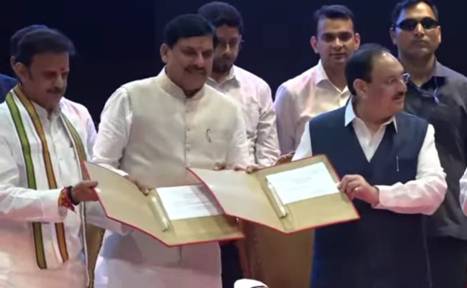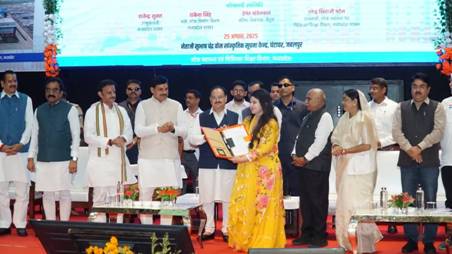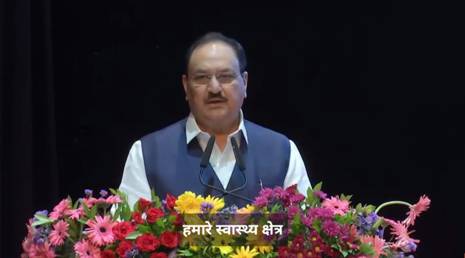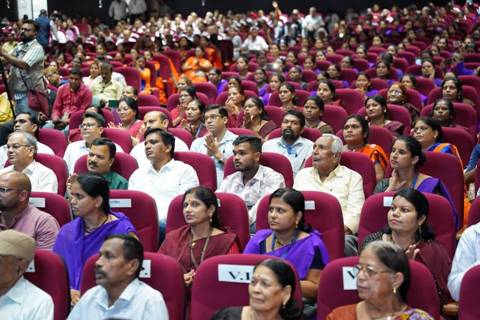Ministry of Health and Family Welfare
Union Health Minister Shri JP Nadda Inaugurates New Government Medical Colleges in Sheopur and Singrauli
Agreements signed to Establish Four New Medical Colleges in Madhya Pradesh under PPP Mode with Union Health Ministry Support
Launches distribution of 8 Lakh Vay Vandana PVC Cards
Smart Chatbot ‘Ayushman Sakhi’ introduced to enhance citizen services
Swasthya Yakrit Mission achieves milestone of 1 crore screening
‘Asha Samvaad’: New platform launched for direct interaction with ASHA workers
Awareness campaign on maternal nutrition launched with posters and new Mother & Child Protection Card
Under the leadership of Prime Minister Shri Narendra Modi, the focus of India’s national health policy is to develop a holistic health care system: Shri J P Nadda
“With 17 Government Medical Colleges and 13 Private Medical Colleges, Madhya Pradesh is emerging as a strong performer in the health sector”
“Every year, nearly 2 crore children and 2.5 crore pregnant women are monitored under our healthcare system”
“Tireless efforts of ASHA workers have ensured that healthcare truly reaches the last mile”
“Institutional deliveries have risen to 89%, a remarkable achievement in ensuring safe motherhood”
“NEET exam was introduced in 13 languages to enable students from rural and remote areas to pursue medical careers”
Inauguration of two medical colleges in Sheopur and Singrauli goes on to show the commitment of the government for tribal population: Dr Mohan Yadav
प्रविष्टि तिथि:
25 AUG 2025 7:00PM by PIB Delhi
Union Minister of Health and Family Welfare, Shri Jagat Prakash Nadda inaugurated new Government Medical Colleges in Sheopur and Singrauli, along with a series of centrally sponsored health programmes aimed at strengthening public health and community outreach in Madhya Pradesh. Dr Mohan Yadav, Chief Minister, Madhya Pradesh; Shri Rajendra Shukla, Deputy Chief Minister, Public Health and Medical Education Department, Madhya Pradesh and Shri Hemant Khandelwal, MLA, Betul, Madhya Pradesh were also present.

Speaking on the occasion, Shri J P Nadda highlighted the Government’s vision of expanding access to quality medical education and healthcare services, while ensuring that citizens across the country benefit from modern facilities and preventive health initiatives.
As part of the programme, the following initiatives were launched:
- Inauguration of New Government Medical Colleges in Sheopur and Singrauli: These colleges will significantly expand opportunities for medical education and healthcare delivery in underserved regions.
- Distribution of 8 lakh Vay Vandana PVC Cards: Aimed at facilitating access to health services for beneficiaries.
- Launch of ‘Ayushman Sakhi’ Smart Chatbot: An interactive platform designed to provide citizens with easy access to information and support under health schemes.
- Milestone under Swasthya Yakrit Mission (Healthy Liver Mission): Achievement of 1 crore screenings under the mission was formally announced.
- ‘Asha Samvaad’ initiative: A new platform enabling direct interaction between ASHA workers and the Ministry was inaugurated.
- Maternal and Child Health promotion: Release of communication material on maternal nutrition, along with the introduction of the new Mother and Child Protection (MCP) Card.

On the occasion, agreements were also signed for the establishment of four new Medical Colleges under the Public–Private Partnership (PPP) mode with the support of the Union Health Ministry, further expanding opportunities for medical education and service delivery in the state.
These initiatives mark a significant step towards expanding medical education, strengthening preventive healthcare, empowering frontline health workers, and improving maternal and child health outcomes in Madhya Pradesh.

Shri Nadda noted that with 17 Government Medical Colleges and 13 private colleges, Madhya Pradesh is emerging as a strong performer in the health sector. He highlighted that under the leadership of Prime Minister Shri Narendra Modi, the focus of India’s national health policy is to develop a “holistic health care system”, which not only focuses on curative part in health care but also emphasises on the preventive care, palliative care, rehabilitative care, geriatric care and promotional health care.
The Union Health Minister stated that in the last decade, the government has created a robust health system. “Every year, nearly 2 crore children and 2.5 crore pregnant women are monitored under our healthcare system. I salute our dedicated ASHA workers, whose tireless efforts have ensured that healthcare truly reaches the last mile. From the moment a woman conceives, she receives five antenatal check-ups within the government healthcare system – a clear reflection of the strength and robustness of our public health framework. Today, institutional deliveries have risen to 89%, a remarkable achievement in ensuring safe motherhood”, he said.
Shri Nadda highlighted the sharp decline achieved by the country in maternal and child mortality. The Maternal Mortality Ratio (MMR) has fallen from 130 per 1 lakh live births to 93 per 1 lakh, while the Under-5 Mortality Rate (U5MR) has declined by 42% - far higher than the global average decline of 14%. Similarly, neonatal mortality has reduced by 39%, compared to the global decline of 11%.
Under the National Non-Communicable Diseases Programme, screening efforts have reached unprecedented levels:
- Hypertension: More than 39 crore individuals screened, with 5.2 crore diagnosed.
- Diabetes: 39 crores screened, with 3.5 crore diagnosed.
- Oral Cancer: 33 crores screened, with 1.52 crore diagnosed.
- Cervical Cancer: 10.3 crore screened, with 90,000 diagnosed.
- Breast Cancer: 17 crores screened, with 42 lakhs diagnosed.
These figures highlight the scale and seriousness with which the Union Government is addressing the challenge of non-communicable diseases and cancer detection, he stated.
The Union Health Minister informed that the Ayushman Bharat scheme has emerged as the world’s largest health coverage programme, with 50 crore beneficiaries. Over time, schemes such as Vay Vandana have been added to extend protection to citizens above 70 years of age, irrespective of their economic or social status.
Shri Nadda highlighted the significant strides in medical education, stating, “In 2014, there were 387 medical colleges in the country. Today, that number has increased to 780, reflecting the government’s commitment to strengthening healthcare infrastructure. Likewise, the number of undergraduate (UG) medical seats has grown from 56,000 to 1,70,000. Looking ahead, our goal is to add another 75,000 UG and PG seats over the next five years”. “Additionally, out-of-pocket expenditure on healthcare has significantly reduced — from 62% earlier to 39% now”, he added.
Shri Nadda also emphasized the transformative steps taken to democratize access to medical education and strengthen India’s global health leadership. “We introduced the NEET exam in 13 languages, enabling students from rural and remote areas to pursue medical careers. In the past, it took 20–28 years for India to develop or access vaccines like tuberculosis, tetanus, and polio, and nearly 100 years for the Japanese encephalitis vaccine. However, during the COVID-19 pandemic, India developed two indigenous vaccines in just 9 months — a remarkable scientific achievement. Through the Vaccine Maitri initiative, these vaccines were delivered to over 100 countries, 48 of which received them free of cost, showcasing India’s commitment to global health and humanitarian values.”
Dr Mohan Yadav highlighted the significant progress made in the health sector during the last decade. He stated, “Before 2003, there were only 5 medical colleges in the state. Today the number has grown to 17 government medical colleges and 13 private medical colleges. AIIMS Bhopal was also recently established in the state. Now, with the recent approval letters for 2 more medical colleges, the total number of government medical colleges has reached 19. We are confident and hopeful that this number will rise to 26 in the coming years.”
He stated that the inauguration of two medical colleges in Sheopur and Singrauli goes on to show the commitment of the government for tribal population. He also credited the Ayushman Bharat PMJAY scheme that gives 5 lakhs of financial help for the downtrodden. “To provide land for medical colleges at Rs. 1/- per acre has been monumental step for PPP model colleges and hospital”, he further stated.

Background:
Community participation is essential in the implementation of all our health programmes.
ASHA workers are the crucial link between the health department and the community. In Madhya Pradesh, the total number of ASHAs and ASHA facilitators is around 70,000.
For ongoing long-term programmes, it is necessary to directly convey health messages, orient the training provided, showcase good work in an inspiring manner to encourage others and to resolve difficulties related to the programmes as well as provide quick and appropriate answers to their queries, a medium of communication is required. This is a continuous process, for which a platform is necessary to connect with more than 72,000 people at the same time. To fulfil this objective, the ASHA Samvaad YouTube channel has been created. Through this channel, every Thursday, for 20 minutes, the health department will establish direct contact and communication with all ASHAs.
In line with the Central Government’s anti-obesity campaign and the Fit India Movement, NHM in Madhya Pradesh has screened more than 1 crore citizens, setting a milestone through the “Swasthya Yakrit Mission” (Healthy Liver Mission). This is a golden step towards the vision of a Healthy Madhya Pradesh and a Fit India. The mission has established a new benchmark for preventive healthcare services in the country. It is a pledge to provide timely screening, treatment, and a healthy future to millions of lives.
To ensure smooth maintenance of maternal and child health services in the state, the Mother and Child Protection (MCP) Card has been revised. In the current card, only ANMs (Auxiliary Nurse Midwives) and CHOs (Community Health Officers) could record data related to the health services provided to pregnant women and children. In the revised MCP card, along with ANMs and CHOs, doctors can now also record management and sonography details, as well as services provided under PMSMA (Pradhan Mantri Surakshit Matritva Abhiyan) and at health facilities.
Additionally, the revised card enables monitoring of newborn health during home visits and systematic documentation of child development. The card now covers a wide range of maternal health services such as sonography tests, hemoglobin, HIV, syphilis, sickle cell, blood pressure, urine tests, provision of Iron Sucrose and FCM injections for anemia management, and other essential investigations.
Regular and timely consumption of Iron-Folic Acid (IFA) and calcium tablets from pregnancy till six months after childbirth is extremely important for the health of both mother and child. With this perspective, seven posters have been developed to promote IFA and calcium consumption, dietary diversity, health checkups, and the support of husbands/mothers-in-law in the community. These are as follows:
- Importance of iron consumption during pregnancy
- Husband’s participation in iron intake and dietary diversity
- Importance of dietary diversity and IFA & calcium intake for lactating mothers
- Role of husbands in IFA, calcium, and health checkups during pregnancy
- Correct method of IFA and calcium consumption
- Support of mothers-in-law in iron intake, nutrition, and care
- Nutritional preparedness before conception
For the development of these posters, detailed discussions were held at the community level with pregnant and lactating mothers, their family members, and frontline health workers. Inputs and experiences of district and state-level officials were also incorporated. These posters can be displayed on social media platforms, at Anganwadi centers, and in hospital waiting rooms.
Medical Colleges at Sheopur and Singrauli, Madhya Pradesh
Both Government Medical Colleges at Sheopur and Singrauli were approved under phase-III of the Centrally Sponsored Scheme (CSS) for ‘Establishment of new medical colleges attached with district/referral hospitals’ in academic year 2019-20 with an approved cost of Rs. 325 crore each. Out of central share of Rs. 195 crores, an amount of Rs. 113.4 crore for each college has been released to the State.
***
MV
HFW/HFM Jabalpur Event/25 August 2025/1
(रिलीज़ आईडी: 2160687)
आगंतुक पटल : 849